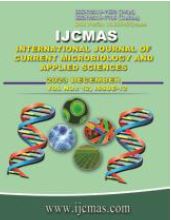


 National Academy of Agricultural Sciences (NAAS)
National Academy of Agricultural Sciences (NAAS)

|
PRINT ISSN : 2319-7692
Online ISSN : 2319-7706 Issues : 12 per year Publisher : Excellent Publishers Email : editorijcmas@gmail.com / submit@ijcmas.com Editor-in-chief: Dr.M.Prakash Index Copernicus ICV 2018: 95.39 NAAS RATING 2020: 5.38 |
Sclerotinia stem rot caused by Sclerotinia sclerotiorum (Lib.) de Bary is the most damaging disease and has been recorded in rapeseed-mustard cultivating nations of the world. It is more common and severe in temperate and sub-tropical regions during cool and wet seasons, although it may also be found in some semi-arid regions where conditions seem unfavourable for disease development. Botanical extracts are used as fungicides to control fungal growth and detection of new antifungal compounds which have no side effects on the environment or animal health. The evaluation of effectiveness of different phytoextracts were carried out through food poisoning techniques. Application of phytoextracts through food poisoning technique significantly reduced the myceliogenic growth of Sclerotinia sclerotiorum. Allium sativum registered maximum percent of mycelial inhibition of S. sclerotiorum, followed by Citrus lemon, A. indica, M. koenigii and A. cepa. Concentration wise, greater myceliogenic inhibition was observed in 15% fallowed by 10% and 5% phytoextract containing petri plates. Absolute mycelial inhibition was observed in A. sativum (15 and 10 % concentrations) treated plates. On the other hand, least efficacy of the phytoextract was observed in 5% A. cepa treated plate. The current in vitro studies of botanicals mycelial growth of S. sclerotiorum revealed that phytoextracts are an important component in crop disease management.
 |
 |
 |
 |
 |